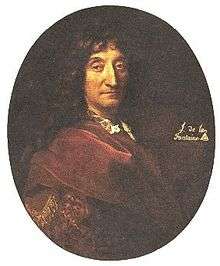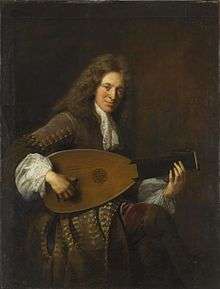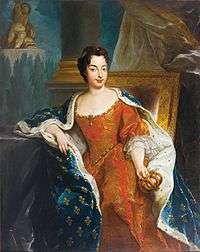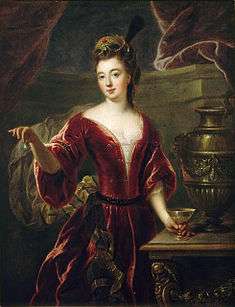François de Troy
| François de Troy | |
|---|---|
 François de Troy by his student Alexis Simon Belle | |
| Born |
François de Troy 9 January 1645 Toulouse, France[1] |
| Died |
21 November 1730 Paris[1] |
| Nationality | French |
| Known for | Painter |
| Patron(s) | Courts of James II of England and James Francis Edward Stuart in exile, French court |
François de Troy (9 January 1645 – 21 November 1730) was a French painter and engraver who became principal painter to King James II in exile at Saint-Germain-en-Laye and Director of the Académie Royale de peinture et de sculpture.
Early life
One of a family of artists, Troy was born in Toulouse, the son of Antoine Troy (28 July 1608 (baptised) - 15 September 1684), a painter in that city,[2] and Astrugue Bordes. François Troy and was the brother of the painter Jean de Troy (4 April 1638 - 25 June 1691).[3] Troy was taught the basic skills of painting by his father, and perhaps also by the more worldly Antoine Durand.[2][4]
François de Troy is not to be confused with his son, the portrait painter Jean-François de Troy (1679–1752), who studied under him.[5]
Career
At some time after 1662, Troy went to Paris to study portrait painting under Claude Lefèbvre (1633–1675) and Nicolas-Pierre Loir (1624–1679].[4] A. P. F. Robert-Dumesnil states that this occurred when Troy was aged twenty-four.[2]
In 1669, Troy married his master Nicolas-Pierre Loir's sister-in-law, Jeanne Cotelle.[4]
In 1671, he was approved (agréé) by the Académie Royale de peinture et de sculpture. In 1674, he was received into the Academy as a history painter, with a reception piece (morceau de réception) entitled Mercure coupant la tête d'Argus ('Mercury cutting off the head of Argus').[2][4]
Troy's early known works include tapestry designs for Madame de Montespan, one of the many mistresses of Louis XIV of France, and paintings with religious and mythological subjects.[4]
In the 1670s, he became friendly with Roger de Piles, who introduced him to Dutch and Flemish painting, and after the death of Claude Lefebvre in 1675, Troy changed his direction to become a portrait artist, aiming at commissions from Lefebvre's former clients. In 1679 he was commissioned to paint a portrait of the Swedish ambassador Nils Bielke, and in 1680 that of Maria Anna of Bavaria (1660-1690), shortly after her marriage to Louis, Dauphin of France (1661-1711), the heir to the French throne, on 7 March 1680.[4] Troy became a successful painter of fashionable single and group portraits.[6] His clients included Madame de Montespan, her son by the king, Louis-Auguste de Bourbon, Duke of Maine, and his wife Anne-Louise-Bénédicte de Bourbon-Condé.[4]
As a result of such commissions, Troy was able to work continuously in court circles for almost fifty years. He was admired for his ability to capture the upper classes and their preoccupation with manners and fashion.[4] Perhaps more importantly, he was said to have the ability to make any woman look beautiful, which made him sought after by all women.[7]
In the 1690s, Troy became the principal painter to the court of King James II in exile at Saint-Germain-en-Laye, where he was the master of Alexis Simon Belle.[8]
By the years 1698 to 1701, a period of peace between France and Great Britain, Jacobites could cross the English Channel carrying portraits of James Francis Edward Stuart and his sister Princess Louisa Maria. Troy was then James II's only court painter and needed the help of Belle, his best student, to produce the many portraits commissioned from him.[8]
In 1698, he was appointed a Professor of the Académie Royale, and in 1708 became its Director.[9]
Troy was an engraver as well as a painter. Among his engravings is one of the funeral in 1683 of Maria Theresa of Spain, the wife of King Louis XIV.[2]
Apart from his son, Jean-François, Troy's other students included André Bouys[2] and John Closterman.
He died in Paris at the age of eighty-five.[2]
Work
The portraits painted by Troy include (see image gallery) -
- Richard Talbot, 1st Earl of Tyrconnell, 1690[10]
- Lady Mary Herbert, Viscountess Montagu, as Diana, c. 1692[11]
- Jean de la Fontaine[12]
- Jules Hardouin-Mansart (1646–1708)
- Élisabeth Jacquet de La Guerre (1665–1729)[13]
- Princess Louisa Maria Stuart (1692–1712), about 1705
- Portrait d'un couple en Vénus et Pâris, 1691, 150 cm by 120 cm, now in the Louvre[1]
References
- Cailleux, Jean, Some Family and Group Portraits by Francois de Troy (1645–1730) in The Burlington Magazine, vol. 113, no. 817 (April 1971), pp. i-xviii
- Brême, Dominique, François de Troy 1645-1730 (Paris, ed. Somogy, Editions d'art, 1997, 199 pages, ISBN 978-2-85056-278-5)
Notes
- 1 2 3 Portrait d'un couple en Vénus et Pâris at the web site of the Louvre (accessed 15 February 2008)
- 1 2 3 4 5 6 7 Robert-Dumesnil, Alexandre Pierre F., Le peintre-graveur français, ou Catalogue raisonné des estampes gravées par les peintres et les dessinateurs de l'ecole française, vol. 7 (1844) p. 337 online at books.google.com (accessed 15 February 2008)
- ↑ Brême, Dominique (1997). François de Troy 1645–1730. Paris. pp. 11–18.
- 1 2 3 4 5 6 7 8 François de Troy at safran-arts.com (accessed 15 February 2008)
- ↑ François de Troy, French Baroque Era Painter, 1645-1730 at artcyclopedia.com (accessed 15 February 2008)
- ↑ Bordeaux, Jean-Luc, Jean-Francois de Troy, Still an Artistic Enigma: Some Observations on His Early Works in Artibus et Historiae, vol. 10, no. 20 (1989), pp. 143-169
- ↑ Robert-Dumesnil, op. cit.: "Possédant l'art de rendre toutes les femmes belles, son pinceau flatteur le fit rechercher de toutes les dames et lui procura une grande vague à la cour."
- 1 2 Corp, Edward, Belle, Alexis-Simon (1674–1734) in Oxford Dictionary of National Biography (Oxford University Press, September 2004
- ↑ Bryan, Michael, Bryan's Dictionary of Painters and Engravers. Volume 5. S-Z (Adamant Media Corporation, ISBN 0-543-93157-9), page 208 online at books.google.com (accessed 16 February 2008)
- ↑ Richard Talbot, 1st Earl of Tyrconnell portrait at npg.org.uk (accessed 15 February 2008)
- ↑ National Trust acquisitions 2003-2004 at findarticles.com (accessed 15 February 2008)
- ↑ Portraits of Jean de la Fontaine at lafontaine.net (accessed 15 February 2008)
- ↑ Notes on the Elisabeth Jacquet de la Guerre Portrait at earlywomenmasters.net (accessed 15 February 2008)
Gallery
- Paintings by François de Troy

.jpg)
Princess Louisa Maria Stuart, about 1705 



The Feast of Dido and Aeneas, 1704 
Charles Mouton, 1690 
Friedrich Baron de Knabenau,1670  Duchess Maria Anna Victoria of Bavaria, Dauphine of France, after 1690
Duchess Maria Anna Victoria of Bavaria, Dauphine of France, after 1690

%2C_Madame_de_Brionne_and_her_son_Louis_de_Lorraine_(c.1697).jpg) Henri de Lorraine's wife, Marie Madeleine d'Epinay and son the Prince of Lambesc, 1697
Henri de Lorraine's wife, Marie Madeleine d'Epinay and son the Prince of Lambesc, 1697- The Duchess of La Ferté-Senneterre with the Duke of Anjou on her lap and the Duke of Brittany, 1710
External links
| Wikimedia Commons has media related to François de Troy. |
- François de Troy at culture.gouv.fr
- François de Troy at the web site of the National Portrait Gallery, London